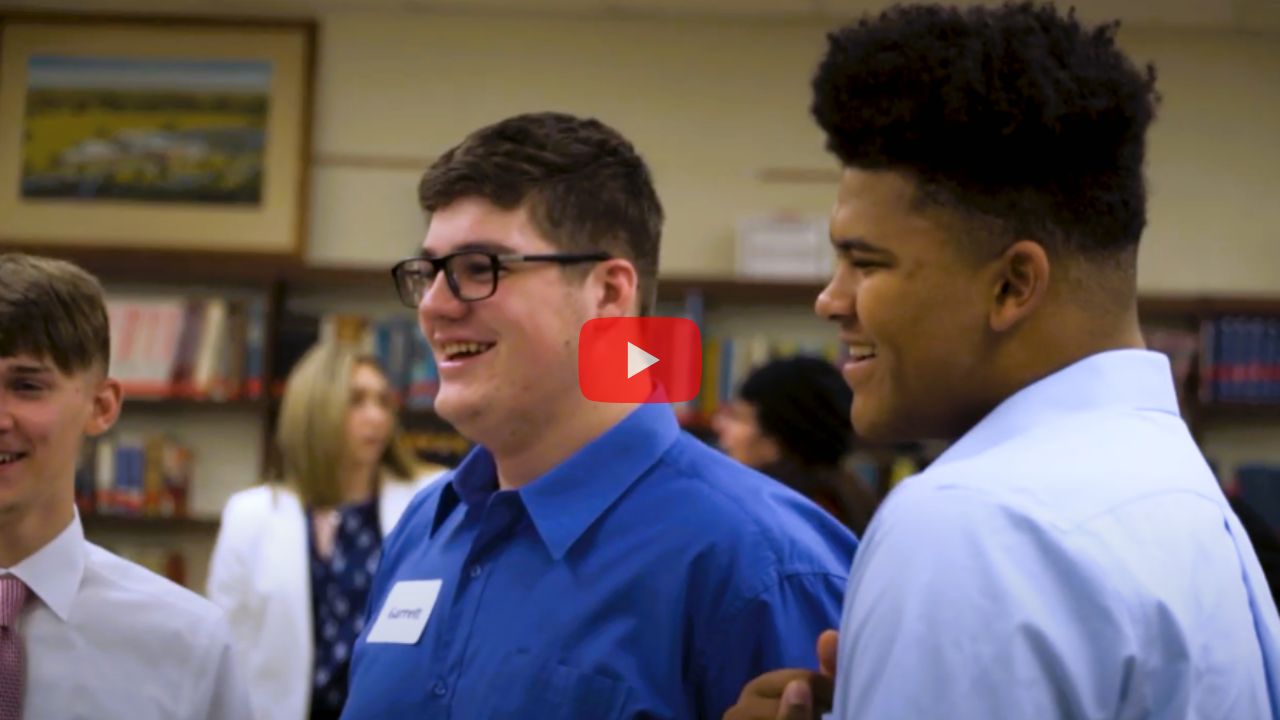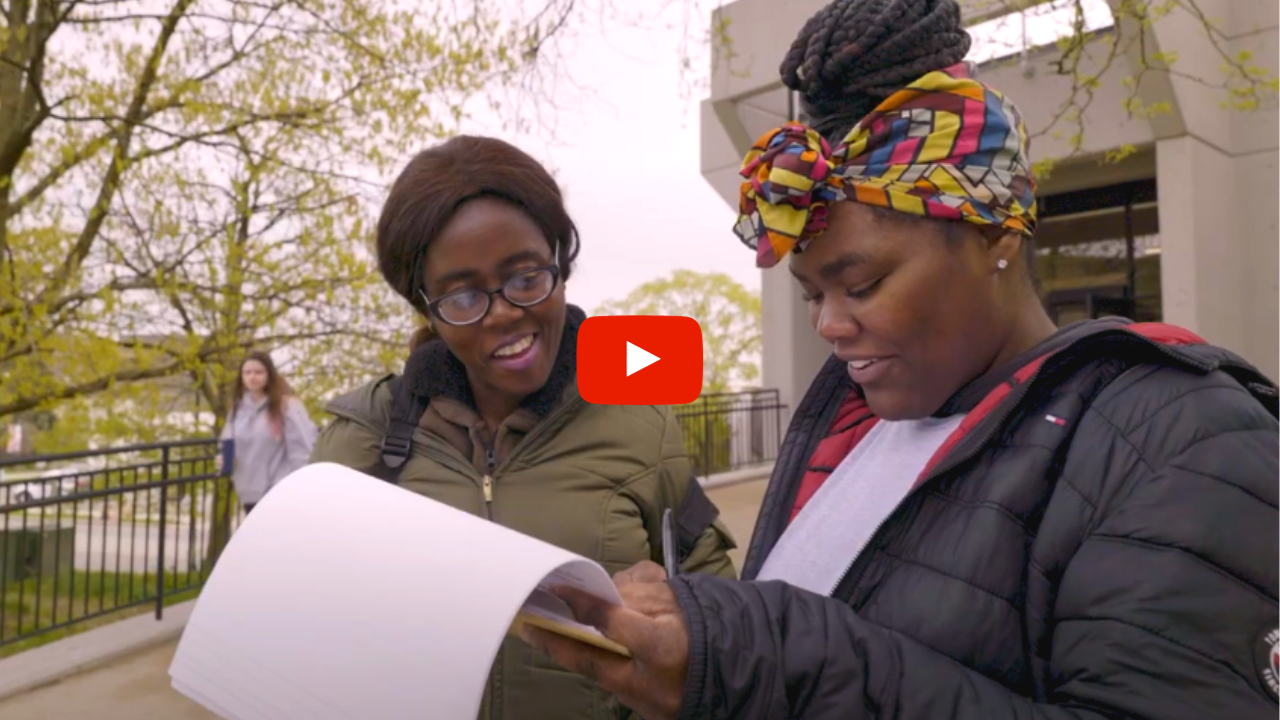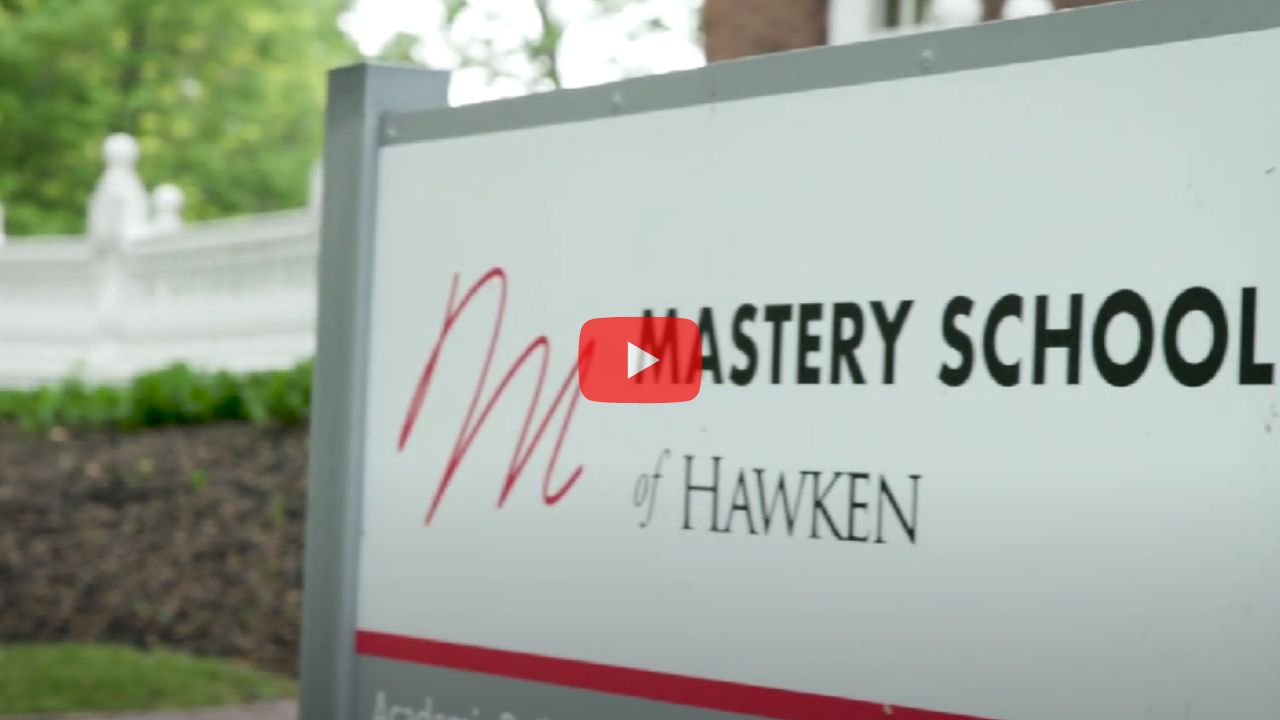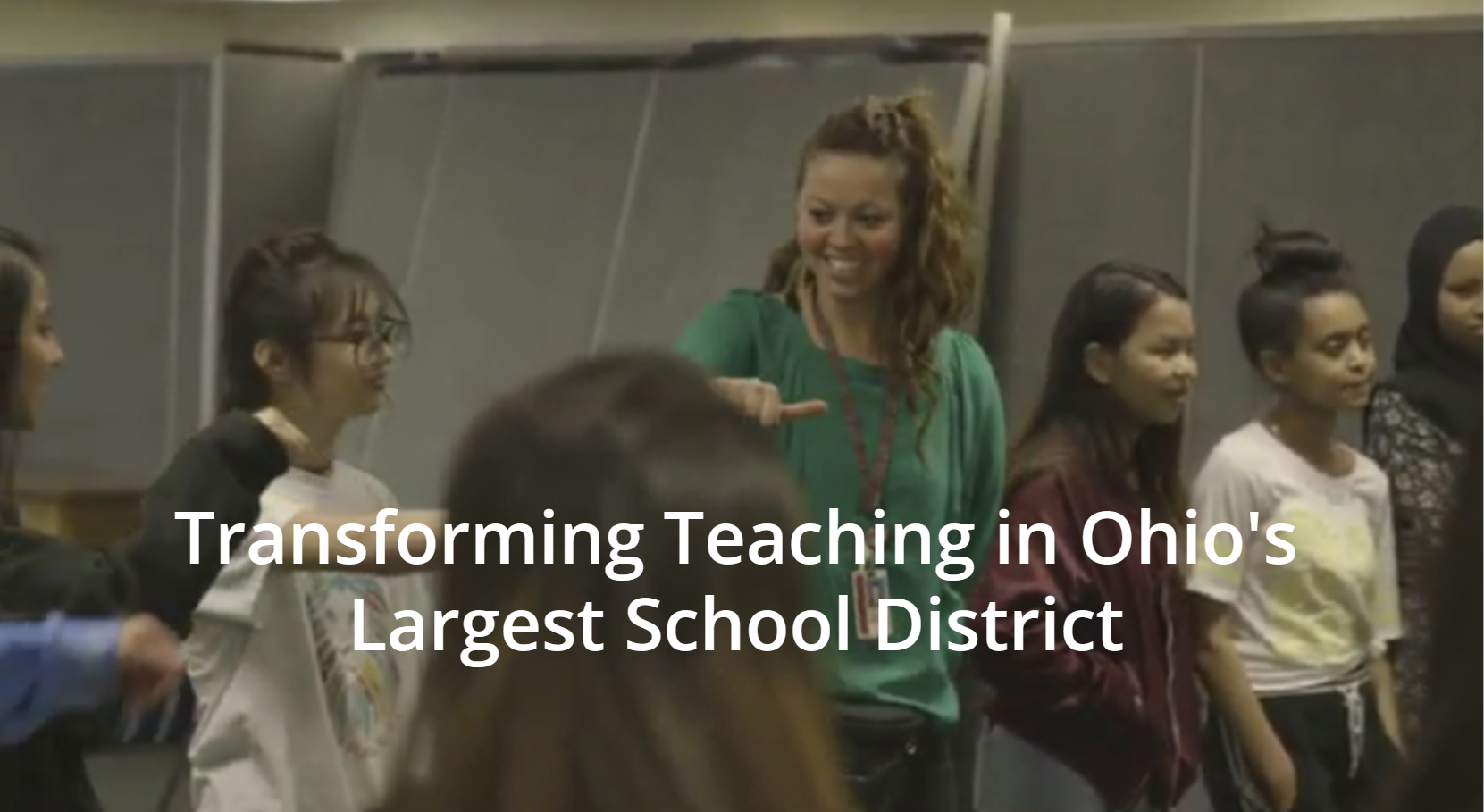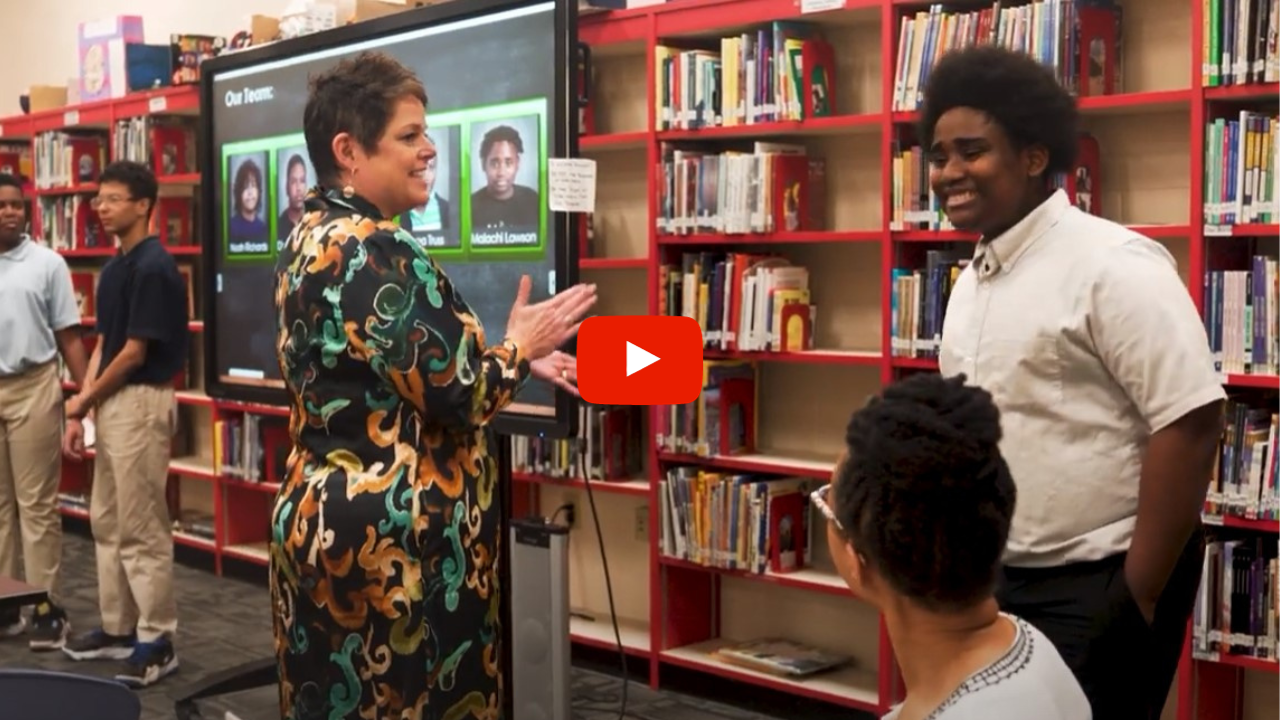In this episode, Doris talks to Terry Chou, science teacher at Joaquin Miller Middle School in California. Terry shares details about her students learning innovation in her Science Enrichment and Research (SEARCH) class. Listen to what she has discovered about teaching at the intersection of science, business and technology.
Do School Better: A Podcast for People Who Want to Transform Education - Listen to more episodes here
Doris: Hey, Terry.
Terry: Hi.
Doris: So, listen, I am really excited to hear more about your search class. And you came to the workshop, the very first one we did back at Steve Blanks house, in his living room, in the summer of 2014. And, you know, we actually communicated quite a bit before you came because you were really doing your homework, I remember, to find a place to go for what you were looking for. And I remember you’re telling me that you were a middle school science teacher at a public school in California. And you really wanted to find ways to excite your students about…
Terry: Yeah, I was looking for…actually I was in the process of creating the search class. Which came about because I wanted to teach innovation en masse and I needed to find, like, ways to do that. And originally the class that I had had in mind was sort of like a science fair class, a science fair prep-class, research, pure research. But kind of thinking back and forth that entire school year and leading up to the summer I realized I really didn’t want to teach that, that what I really wanted to teach was innovation. And then learning a little bit more about what innovation meant, it’s the intersection of science, business, and technology. And so the business part, when it fell into place there, I realized I needed to sort of investigate the business perspective because I didn’t have a business background. I’m completely a science teacher, science person, studied science in college and so on. And so in looking at business perspective, my brother-in-law actually who did study business, he suggested that I look into the lean startup movement.
Doris: Yup
Terry: And from there, from lean startup movement, I came across Mr. Blank. And so I actually emailed him. I emailed him directly about, you know, “I’d like to learn more about this program. I’m a teacher, I have this class that I have in my head that I’d like to kind of fulfill,” and you know, did he have any suggestions for me where I can start because I had no background? And so he actually was the one who said, well I think he actually forwarded my email…
Doris: To me.
Terry: And you, yes. And there at that point was like, “Oh great. There’s this workshop I can go to.” As someone who didn’t have any business background or anything like that but has an idea for using entrepreneurship in a sort of a science elective class. And so it kind of fell in place perfectly timing-wise and curricularly just to be able to immerse myself in that realm of that the business sort of world that I don’t have personal experience with. And so that really just kind of kickstarted. And as I learned more about lean launch pad and the lean startup, I realized it was a perfect fit because essentially the philosophies use the scientific methods to validate all of your assumptions on nine core aspects of a startup business. And it just fell into place at that point.
Doris: Yeah
Terry: Very nicely
Doris: Yeah, no it’s great. And then, of course, the curriculum you built around that, so that’s, you know, it’s like in a science class you may employ the scientific method but how you go about teaching science and teaching the students and getting the students to learn science is all about a whole bunch of other things. And you created a course coming out of that workshop and I remember talking to you in the fall multiple times as you were looking for how to engage the students. And it really was…It’s interesting because you came in thinking you needed to learn about business and that’s what you were looking for. But I actually think this all falls under the heading of innovation.
Terry: Yeah. And I think, especially with sort of as I started in the Fall…so I basically went from workshop to actually teaching the course.
Doris: Yeah, I remember.
Terry: I was able to readily use…like I needed to use disparate tools and sort of, sort of come at it right away with this. And as I started in the Fall, yeah. A lot of things just kind of I realized a few things. One of the things first is that the business part is really is like a scaffold.
Doris: Yup.
Terry: And that scaffold allows students to formalize and they communicate ideas in their head. But the creation, sort of the process of the product design and all that, you know, using technology and trying to figure out which technology would match my students best, that we hammered out throughout the Fall. And I think probably midway, sometime by Winter, I started to realize that the innovation part was great but really this class, at least for my class, was all about learning really deeply about yourself, the students themselves: and how they interact with people, how they communicate with people. And essentially, the concept for me became, okay, you know, we’re really as a teacher my job is really is to elevate these groups of students into teams of students. Otherwise, the innovation just wouldn’t happen. Even if they had a wonderful business and they’re kind of chugging along with the product, the product won’t come to be its full potential if the team wasn’t completely on board. And so then by the Spring when I had sort of my second iteration of the class since it’s a semester long class, I was able to kind of try to focus more on that aspect. And I think since that point, I think that’s been something that I’ve kept in my head as, yes the business is important, yes the learning of science and writing, the literature review, as well as learning the tech and building the product.
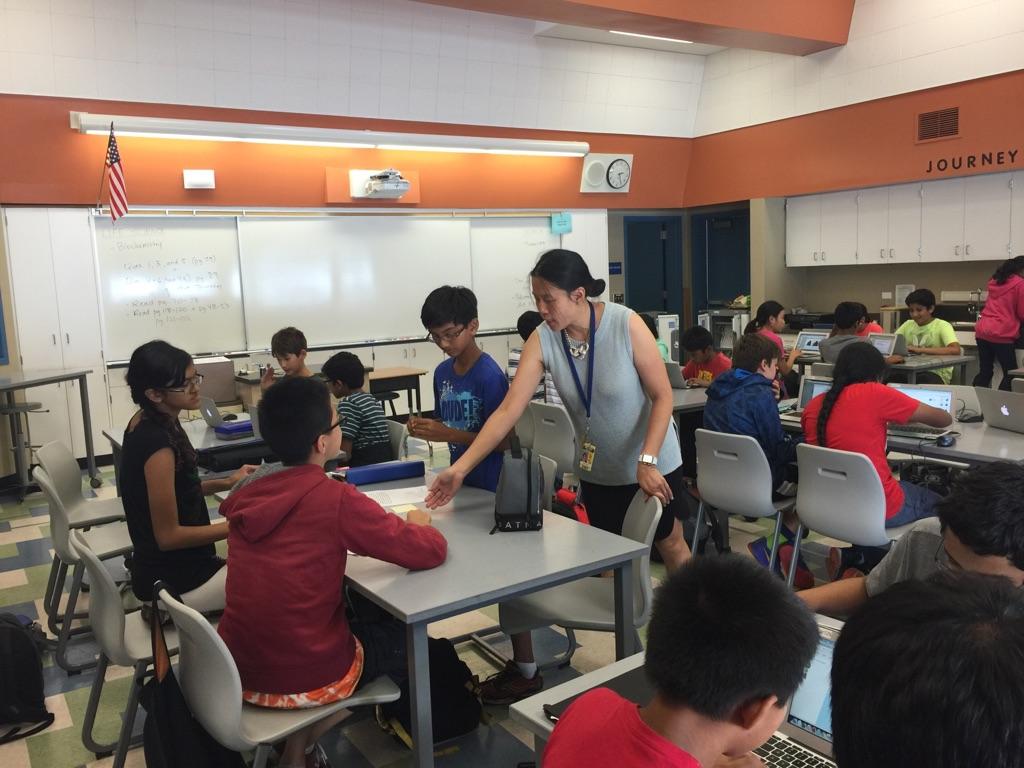

But ultimately, none of it will really push itself to its full potential without the team understanding they have to work together as a team. And so it’s been great actually as a teacher…because you know, I get to then consult and advise teams. And I treat each little startup company as a team from the get-go. I tell them how important it is for them to really think of each other as a team and not as a group. And I think semester after semester we’ve seen kind of like, just it’s been more amazing projects like one after another…
Doris: Yup
Terry: So, and it’s all from the same business structure and the same tech but it’s sort of driving home that message that you have to interact with each other as a team. There’s just, you can’t, you can have all the fancy dreams you want but if you want an actual product to be made and communicated well, it has to come from a team mentality first.
Doris: Right and that’s where all of the approaches that we’ve built that have to do with teams having a real challenge that they’re…that they find meaningful…
Terry: Right.
Doris: …with a deadline where they have to come up with a solution and all that, all those approaches around collaborating productively, feedback, how you give each other feedback, what…how you identify your strengths, bring them to a team, identify, all that stuff that we talk about, that actually is the most powerful part of the whole thing.
Terry: Right, and I would agree with that because the science, the business, the tech, at least for search class, really in order to see it through to its maximum potential that one semester can offer the students, they don’t have that much time actually. And so if they cannot coalesce together, if they cannot resolve their conflicts sooner than later–and they realize this at the very end of the experience–that you know a lot of time is wasted. But then at the end, they realize, “Oh, you know what maybe it’s better that we resolve these conflicts as soon as they show up. Maybe we do need to kind of, I personally need to contribute more when I see either myself or someone else is kind of drifting off and they’re not being productive, they’re not coming in and helping to design.”
And so I think some of them definitely say in their reflection blogs that they realize that they’re better as a leader like on the side. They’ll kind of be able to be a quiet leader. Some have said they like sort of just being able to be at the forefront and sort of dictating as they go. But they realize who they are. You know, they come to a clearer understanding of, “I’m a talker, I like to actively bring people into the…I now know that I need to actively step up my game because I just I let it go. I let everything procrastinate too much.” And or, you know, “I’m better off on the side. I’m a quiet leader and I see that now.”
Doris: And they see that that has just as much value, it’s just that’s who I am and that’s how I contribute.
Terry: Exactly. And so I think that I would identify as the most important thing that is learned in my class. Even though they do learn business and they do learn science and they do learn all this tech, learning about themselves every semester it just comes back to that. They learn more about themselves that anything else.
Doris: And I would argue that…so that is consistent with every single, you know, everybody who does this and implements in their own completely unique way in whatever class in whatever…you know whatever school with whatever aged students says the same thing. They learn crazy amounts of some particular science or they learned a new technology or they really developed their writing. But more than anything else they learned about themselves. And the, what’s the reason we use you know we overuse these words and I wish there were new ones. But the reason it’s so transformative for many of these students is because they realize the extent to which they’re able to learn, what I can do, how I can contribute. It isn’t this closed conversation between the teacher and the student. Teacher gives student an assignment…
Terry: Mm-hmm
Doris: …student does what he or she is told to do, hands it back to the teacher. Teacher pats on head or doesn’t pat on head, says, “Good job” and it’s done. There’s this, in addition to working on authentic problems, doing the work as a team makes it meaningful and relevant and urgent and they take ownership of what they’re doing in a way that they don’t if they’re just an individual contributor in a classroom.
Terry: Right and even if they’re not, I mean I know…so like the whole project-based learning curricular design, actually I was just talking about this to someone at a conference that I had spoken at, the FabLearn conference…
Doris: Yeah
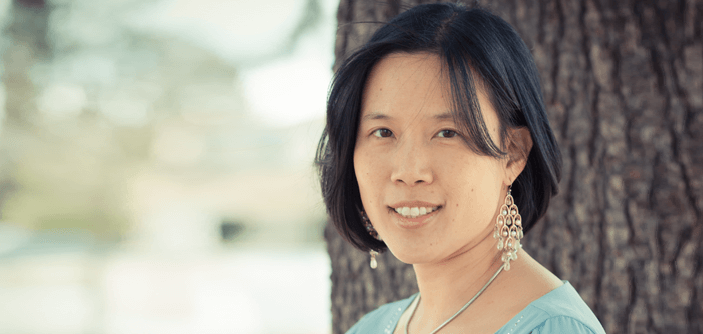
Terry: …at Stanford University this last, two weekends ago. And I was talking to them about project-based learning. And his…he came at it with, “You know, project-based learning is great. And these kids get into groups and they do this project for what? Two, three, four weeks? And then they’re done with the project and then it’s done. And they disband…and it’s then it’s as if you know they move on to a new project. So it’s as if they really didn’t learn as much because it somehow truncated their learning. You know, it was done, the piece was done, they got their grades, and then they move onto new projects, new groups, and so on.” And we were talking about search class actually and I appreciated his comment on, it’s interesting because when you set it up like this where the kids come up with that problem…
Doris: Yeah.
Terry: …and then they have to pursue the solution. And it’s almost like even after the class is done, there is still reason to move forward.
Doris: Absolutely.
Terry: There’s still…the project is never truly, I mean unless you’re actually going to build your business and start your company, there’s still so much more opportunity beyond just that particular project or that class. And so, you know, it…in some ways, this type of class where students define and then pursue solutions or define the problem and pursue solutions of their own, I think does more to promote life-long learners than simply sort of the traditional classroom group project.
Doris: I agree.
Terry: There’s no, the borders are blown wide open. This project can literally go to as far as you want it to. And so it kind of actively gets students to think about well, what’s the next step? You know, versus a lot of projects, even the project-based learning kind of projects, there’s an end point and then you have to move on. But this type of situation, it’s almost begging students well, what’s your next step? What’s your next step? Well, you know, what do you have in plan next? And there’s always a next.
Doris: Yeah, because it because they’re…what they’re working on is real and it doesn’t just it’s not a, “Here’s your assignment, project or not an assignment. And when you’re finished, you’re finished.” It’s there’s this real thing and you’re building, you’re innovating. And they’re passionate about what they’re doing. We had a student we were talking to today who’s in a space where they’re actively working to define the problem that they’re working on in the music space where the four of them are very, are wildly passionate. And he is crazy excited about the opportunity to work on something he’s actually interested in in a class in school. And one of the things that I think is, this does, is that it when you say life-long learner, it redefines students’ relationships with school.
Terry: Right.
Doris: Because they have this, they come into these kinds of classes before they’ve done a class like this, they come in thinking the way this school thing works and my relationship to school is somebody gives me something to do that I must learn. I then learn it well or not and I get some sort of feedback to tell me whether I learned it well enough or not. And we just kind of rinse and repeat that. And when they realize that my crazily, excitedly learning about and researching something I’m interested in, I’m genuinely passionate about also constitutes learning and can even be done within what’s considered an academic course, that that’s really really, that changes how they look at themselves, learning, and school. And I agree, that opens them up to looking at learning as something they want to do.
Terry: Right, and I think that’s, that’s definitely you know something all teachers want to promote. And sort of redesigning their classrooms, or their curricula I should say, is definitely one way to think about when they want that result. And you know I think that also the, I don’t know. I guess…in some sense, I really wish that I were able to take this class and I think that I probably would have had such a different trajectory in life, as well. But I think…
Doris: Oh, that’s really interesting, why?
Terry: Well, I don’t know. Because I think, for me, I didn’t actually give business a chance. I mean I knew I really wanted to be an educator but that also in my head it never occurred to me to even give business a chance. Or even sort of the startup world where science and technology is pretty much integrated into the business, at least in Silicon Valley that’s where we’re at. It just never occurred to me that I would find a place for myself there. But I’m glad I didn’t. I mean I think in education there is so much to innovate, which kind of gets me to think that I think maybe one of the keys for teachers is in order to sort of help a lot of the teachers out there kind of bring them into this new perspective is that they need to think of themselves as an innovator as well. And that, you know, they may not be in a trendy, high-tech, Silicon Valley startup but that doesn’t mean that you know teachers can’t be those innovators. And we innovate on our curriculum. You know, that’s how we are able to push the boundaries and for ourselves become that lifelong learner too. You know, I just so appreciate actually having the experience now of teaching this entrepreneurship kind of aspect to my class. It’s…you know, I think it’s been a great thing for me.
Doris: You said that beautifully. I couldn’t agree more. And I really will say, I don’t even think it’s about business. I think everything you’re talking about is about innovation.
Terry: Right. And I think that’s where…right, I totally agree. I think innovation, the spirit of innovation, and just the pursuit of it is really critical for student and teachers alike. And…you know, I think coming away from this particular conference that just happened so it’s fresh in my head that, you know, it is a movement. I truly do believe that. It is not just some passing fad or, you know, a maker space might be a fad. The just sort of a room that people go to to drill and to laser cut and to 3D print. But the maker education movement, the sort of movement towards innovation from the teacher’s perspective as well, the…
Doris: Yup.
Terry: I don’t know if there’s an umbrella term for all of it. But that sort of thinking…I think it is something that once started, the ripple effects is just gonna continue.
Doris: I could not agree more. And you said all of that so well. I’m gonna end that here but that was fabulous. Thank you, Terry. And I loved seeing the excitement of your students when I came to visit you. And, they were on fire. And, by they way, learning not only about innovation, and customer development, and pitching and communications but also learning a lot of science. And they were jazzed about it.
Terry: Right. Yes, they can see finally how science is applicable to their lives.
Doris: That’s awesome. Hey, have a great day. Thanks, Terry.
Terry: All right, thank you so much.


